Tell me what’s your dream! I know you got one— if your dream is to see a magnificent Broadway show right in your back yard, well guess what, Baltimore? The Hippodrome is making that dream come true! Touring through for a one-week limited engagement, Pretty Woman, the musical based on the Touchstone Pictures motion picture from 1990, is a joyful, powerful, wondrous dream come true with all the hallmarks of a perfect screen-to-stage production. Directed and Choreographed by Jerry Mitchell, this heartwarming love story will appease the masses— those who’ve seen the movie and those who haven’t— with its enchanting storyline, adventurously enthusiastic dancing, and astonishing performances.
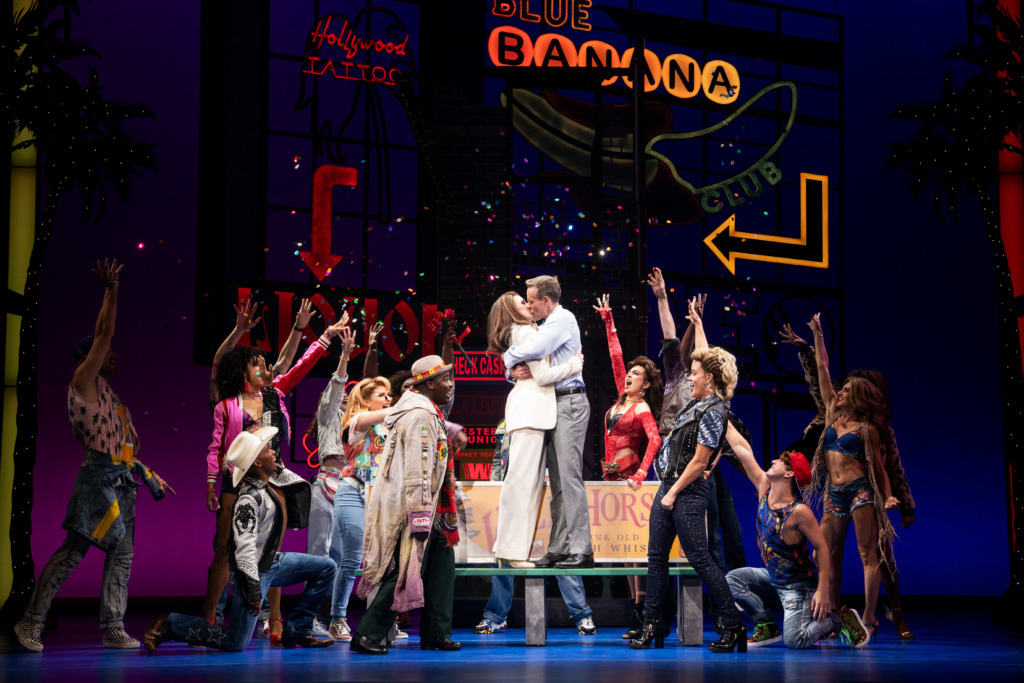
Welcome to Hollywood— boulevard that is— in 1989 where the fashion is screaming, the dancing is rowdy, and the ‘professionals’ are on their beat, kicking it up in the street. Pretty Woman’s design team— Scenic Designer David Rockwell, Costume Designer Gregg Barnes, Lighting Designer Kenneth Posner & Philip S. Rosenberg, and Hair Design Josh Marquette— put forth a stellar production with most dazzling aesthetics imaginable. It looks and feels like real Broadway magic without all the hassle of having to go to New York and pay New York prices.
David Rockwell creates a versatile set which invites the audience to imagine the disparity between Vivian Ward’s street-walker life and Edward Lewis’ polished life of opulence and privilege. The sketchy street corners with all of the garish neon lighting fixture juxtapose sublimely against the posh decadence of the hotel interior and penthouse suite. Rockwell’s most impressive scenic feature is the opera box for the iconic film scene where Edward takes Vivian to the opera— its gold gilded, decadent, and completely sets the mood for the show.
Accompanying Rockwell’s amazing set pieces is the illuminating work of Lighting Designers Kenneth Posner & Philip S. Rosenberg. Alternating between clever mood lighting that fits the bill for each of the more subdued moments and numbers to more obnoxious and loud lighting, which highlights some of the more edgy dance numbers, particularly those out on the street— “Rodeo Drive” and “Welcome to Hollywood”— Rosenberg and Posner create a full luminary support system for both Rockwell’s scenery and the story at large. There is a striking moment where Vivian is alone in the penthouse suite and the flooding flash of subdued mauve backlighting almost washes the scene to look like something out of the golden age of ‘yesteryore Hollywood.’ That moment quickly dissolves into popping electric and surprise pinks as the scene jumps into “Luckiest Girl in the World.”
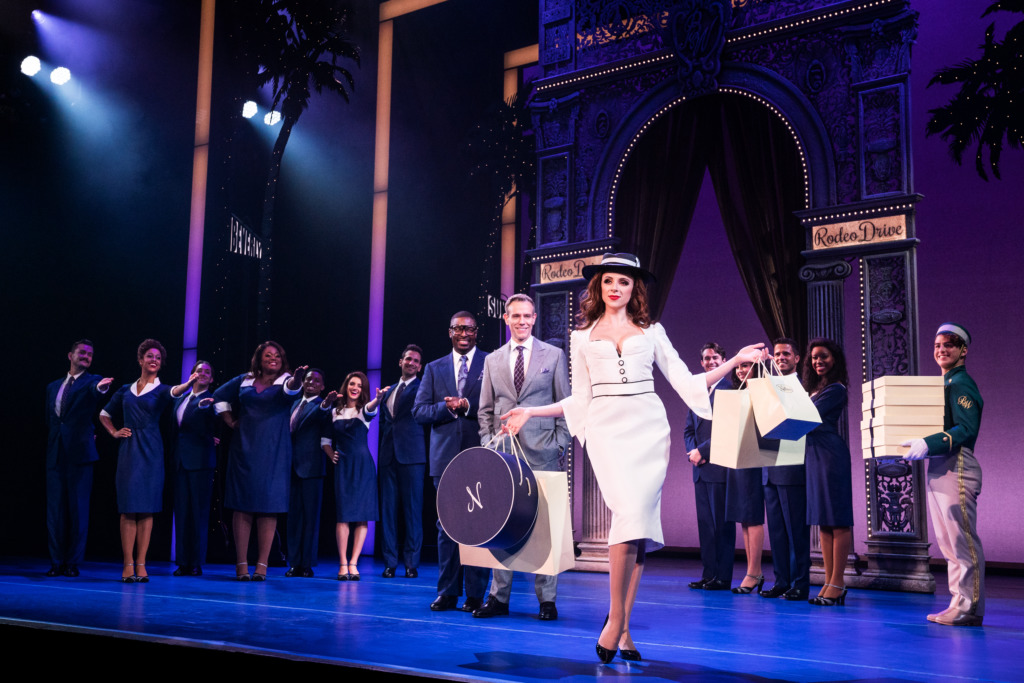
Every person who has ever loved fashion is going to want to go shopping through Costume Designer Gregg Barnes’ sartorial selections for this show. While Barnes masterfully presents the dichotomy of Vivian— her own clothes verses her ‘pretty woman’ clothes— there are so many other eye-popping looks placed all throughout the performance that you just want to grab Edward Lewis’ limitless credit card and buy them all. Most of the “fashion forward” outfits are paraded around on the ensemble during “Rodeo Drive” creating this illusion of living mannequins on display. Barnes’ gives the shop girls their prissy couture feel in matching suits the same way he embellishes the hotel staff in their money-green suits. Every time Vivian gets a new splashy ‘pretty woman’ outfit, it fits her flawlessly. Josh Marquette on Hair and Fiona Mifsud on Makeup deserve nods of praise for completing these looks, particularly when it comes to Kit’s ratty teased blonde wig and the way all of Vivian’s wigs and painted faces come together to transition her character throughout her story arch.
Director and Choreographer Jerry Mitchell is bringing the fire, the heat, the feelings, the wonder, the amazement— all of it. The ensemble are a living, pulsating, breathing background fixture that kick up the dance routines an extra notch, really fabricating that ‘Broadway’ feel into a magical, palpable reality, particularly in the group numbers like the big blazing opening “Welcome to Hollywood” and the finale number “Together Forever.” The tango during “On a Night Like Tonight” is one of the most sensual and yet fabulously enjoyable numbers featured in Mitchell’s choreographic repertoire. There isn’t a moment during the production where the dancing isn’t astonishing— crisp and clean in its execution, perfectly suited to the tempo and style of the song being sung and finessed with a flair that reads like true stage wonder.

Standouts among the ensemble include Violetta (Amma Osei) who simply steals the scene during “You and I”— the film’s iconic opera scene— earning herself a thunderous ovation as the stunning opera performer. Osei appears in a glorious garnet-colored, velvet looking opera diva dress and when she belts out her operatic notes in true opera style— she is the epitome of what mot people experience at the opera. You have no idea what Osei’s character is singing because you don’t speak the language but you know exactly what she’s feeling because she emotes those moments with every fiber of her soul, body, and being. Osei deserves both the ovation she receives during that musical number as well as the one she receives during the show’s curtain call.
The real show-stopping show stealer is Giulio (Trent Soyster.) You won’t be able to take your eyes off of him between his comedic antics, interacting with both Edward and the ‘Hotel Manager’ (who is really just the all-purpose Fairy Godfather of the show, Happy Man) all throughout the performance, and his jaw-dropping dancing, Soyster becomes this amazing character that you just want to take home with you at the end of the night. His body language portrays a great deal of physical humor and his dancing skills are second to none in this performance. Feather-dusting with Vivian’s wig, leaping and lilting all over the stage during the tango in “On a Night Like Tonight” and just generally being this fabulous spark of youthful exuberance, buoyant with the gaiety of true simplistic joy, Trent Soyster will keep you laughing, keep your spirits high, and certainly lift you up— and his character is just the bellhop!
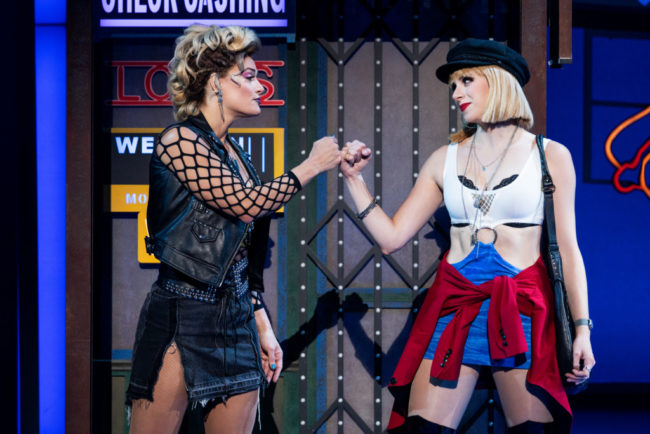
With fiery vocals for miles and an attitude to match, the way Jessica Crouch is bringing Kit De Luca to life is beyond accurate description. She’s simply giving a performance that must be seen to be believed. With powerhouse vocals that could blow the rooftops off of every shop up and down Rodeo Drive, when Crouch blast-belts her way into that number, you’re getting chills, thrills, and all of that gorgeous, glittery grunge-rocker sound you expect from this sassy, sultry, streetwise character. Crouch gives the Kit character true emotional grit and depth, a rare combination for this type of sidekick character in a Broadway musical. You can hear Crouch riffing those vocal options for miles when she gets to add her vocal prowess to “Never Give Up on a Dream” and pretty much anywhere else she sings. Truly devoted to the Vivian character, Crouch’s Kit looks out for her own but keeps Vivian at heart, always. She’s got knockout vocals and a killer personality and really owns the spotlight when its featured on her.
Suffering from ‘Main-Character-Syndrome’ in the best way possible— Happy Man (at this performance Michael Dalke) becomes the show. (That isn’t to say that Vivian and Edward characters don’t hold their own— but this performance given by Michael Dalke makes this a three-way tie for whose show it really is.) As the self-proclaimed Fairy Godfather of Hollywoodland, Michael Dalke’s Happy Man is sensational. His animated and overly exaggerated facial features alone are enough to make your stomach squeeze from laughing so hard. The Happy Man takes on a bunch of different roles— including the main position of Hotel Manager— but watching him pop up all throughout the performance, waggling his eyebrows in a cheeky ‘hey, it’s really me, wink-wink’ fashion is utterly hysterical. When he physically pops up from the conductor’s pit during the opera scene, the audience loses their mind with laughter. His shenanigans and comedic theatrics in this performance are second to none (though the aforementioned Trent Soyster as Giulio gives him a run for his money.) The beauty of Dalke’s performance is two-fold. Not only is he a comedic genius adding hilarious, superb dance routines, and a guiding light when he’s on the streets of Hollywood Boulevard as the literal ‘narrative beacon’ to both the characters and the show, but Dalke provides this beautiful emotional support pole when he plays the hotel Manager, giving both Vivian and Edward something to ground themselves upon. Dalke’s voice is phenomenal when he’s oozing and belting and singing his way through each of his numbers, particularly the show’s openers and closers. Dalke is cheeky, sincere, funny, loveable, and just all-round perfect in this role.
As the story goes, Vivian Ward (Olivia Valli) is a ‘street professional’ who falls by chance into the paying arms of Edward Lewis (Adam Pascal) and naturally things arise— including feelings— and the show evolves from there, essentially down the plot path of the movie. And while the stage show is different from the film, both Olivia Valli and Adam Pascal have done a beautiful job tempering these characters to both fit the musical as it stands and also bring some their screen-counterparts’ mannerisms, personalities, and deliveries into their performances. (You don’t want them to be Julia Roberts and Richard Gere but there are shadows of homage that really fit the way they bring these characters to life.)
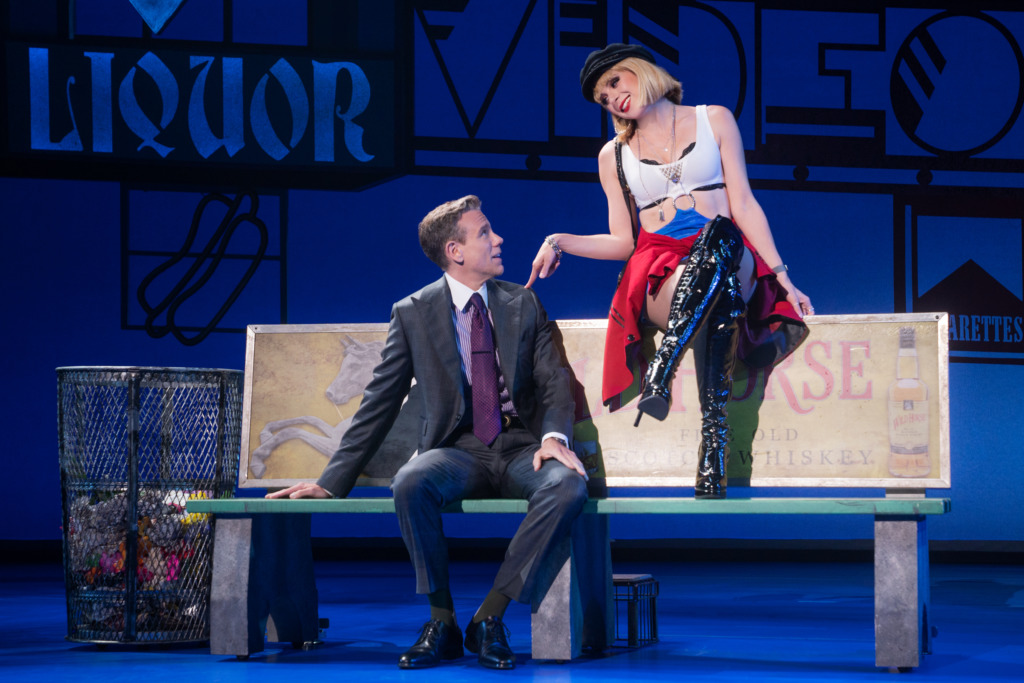
Olivia Valli slides into the role of Vivian like a second skin. From the moment you meet this enigmatic, diamond-in-the-rough, you’re cheering for her whether you know it or not. Valli is dynamic and versatile in all that she presents, giving the Vivian character a resiliency like no other. The stunning relationship chemistry that Valli develops with Adam Pascal’s Edward is truly one of the most remarkable features about the production. It’s a smoldering, tender, slow-going entity all its own, not without hiccups and snags, so that when it does reach its conclusion the audience feels deeply satisfied. “This is My Life” is one of several power-ballad, emotional-heart-pouring, 11’o’clock hybrid numbers that Valli pours her heart, soul, and vocal talents into— it’s the torch song of what her hopes and dreams could be, it’s the final knock-down-drag-out of what her life once was— there are so many things happening in this number and Valli gives them to the audience full-stop. And it’s balanced with true mesmerizing wonder because as she’s laying there pouring her soul into this number, Adam Pascal’s Edward is sitting there, motionless, wordless, and yet you feel how present and absorbent and compassionate he is in this moment all through simply glances that he trades back with her. Valli all but brings the house down with her rendering of “I Can’t Go Back” and every girl who has ever had to pull herself up— regardless of what she’s pulled herself up from— feels as if Valli’s Vivian is singing that and intending that directly to her.
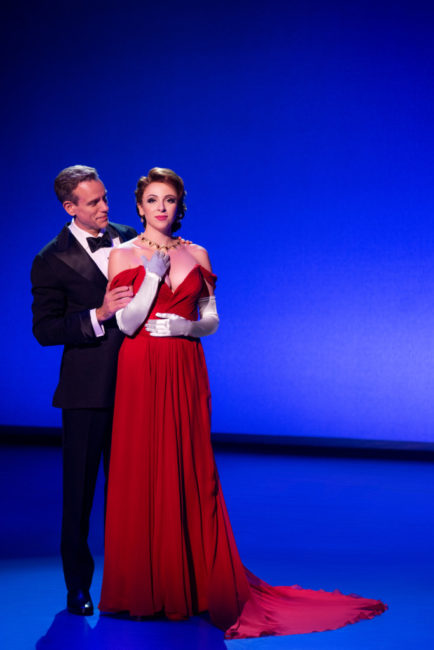
Adam Pascal, Broadway legend that he is, does not disappoint in the role of Edward. Some might say this has an even meatier potential of depth for Pascal to delve into, and he does exceedingly well, because although there are plenty of songs in which Pascal blows the audience away with his rockstar vocals and emotional control housed within that sound— so many of Edward’s true moments come outside of those songs and Pascal nails each one with flawless perfection. Understated and just a little silly at times, Pascal’s Edward is exactly what every woman who’s ever just wanted to be seen feels they need in a man. You get the sound that Pascal is known for roaring out of “Freedom” and he just stops your heart with all of that power, truth, and emotional beauty. “Something About Her” defines the turning point of Edward in this show and Pascal lays it down with such emotional clarity that every girl in the audience feels like they could be Vivian and he’s singing right to them.
Don’t fight the dream; invite the dream. It’s invited to Baltimore’s Hippodrome Theatre for this week only and you won’t want to miss it. Pretty Woman is that quintessential Broadway musical that we’ve all been waiting for and the dream that it truly is has finally arrived.
Running Time: 2 hours and 30 minutes with one intermission
Pretty Woman plays through April 10th 2022, at Baltimore’s Hippodrome Theatre in the France-Merrick Performing Arts Center— 12 N. Eutaw Street in the Bromo Seltzer Arts District of Baltimore, MD. For tickets call the box office at (410) 752-7444 or purchase them purchase them online.
